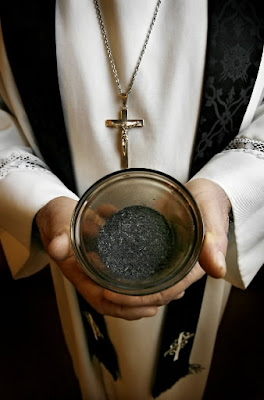Wednesday was one particularly important days of the liturgical year, involving a ritual often viewed as distinctively or exclusively "Catholic," often to the dismay of Protestants belonging to denominations which retained enough from the Catholic church for their more radical Protestant brethren to criticize them as remaining still far too "popeish" -- Lutherans, Anglicans (including Episcopalians), Methodists (who after all were at one time Anglicans themselves). . . really anyone who recognizes some sense or value to a liturgical year might find themselves marked by an ashy cross smudged on their forehead. This includes those Evangelicals who, regretting losses which occurred through ever more radical waves of Reformation, are now finding value in cautiously reappropriating rituals, notions, actions, lines of thought, ways of life formerly considered far too Romish. My partner texted to tell me how startled she was at the sight of a drive-through where one could be marked with the sign of repentance. For me, that is Evangelicals doing things as they tend to do them best, enthusiastically, exploiting aspects we Christians less experimental and settled in our ways of doing things would never think of, sometimes introducing a bit of unintentional comedy.

Ash Wednesday introduces the season of repentance -- with prayer, alms-giving, fasting as the traditional pillars. Every religious tradition I have studied -- and I've not only been researching religions since I was a teenager, but had the opportunity to teach a Religious Studies curriculum for 6 years at a former job, so I've covered quite a few -- every religious community has some way of marking time, of structuring the cycles and patterns of life, something akin to a liturgical year, in which narrative intersects with and is enacted within calendar, where feasts or fasts for some at least are prescribed or proscribed, where space and time, and even silence for self-reflection is opened, where the theme of sin, distance from God and from neighbor, from the persons we ought to be (and study of actual world religions, in their practice, in their scriptures, will tell you that the notion of sin is a lot more widespread than some polemically maintain), becomes a focus. Sin is multiform and multifaceted, and may be grasped by numerous holds, some of them intellectual, some of them much more affective, some more global, involving universal experiences and conflicts, others so personal that the one holding them within may doubt whether anyone else has ever felt, suffered, done, and regretted what -- or like -- they have. And all of those complexities and stances, realizations, and progressions and degenerations of moral life are rolled up, implicitly, into the ordering of Ash Wednesday, and Lent, and the Passion, and Easter and . . . .
I pray the
Liturgy of the Hours (these days using
iBreviary) -- at some times of my life diligently, at others desultorily -- or better put, since I hardly feel as if I'm praying them, I read them, I speak them, or I sing them. This is another one of those complex intersections of text, ritual, daily practice, tradition of whose depths and fertility some Evangelicals, among others, are becoming aware and enamored. The Liturgy consists in arranged prayers, many of them
Psalms, read at given points in the day. There is a cycle to it, where canticles and verses, Scripture readings and commentaries (in the Office of Readings) bob and weave, dance and chant their ways in and out of the weeks and months. The Liturgy of the Hours is a complex pattern woven largely out of Scripture, and if one desires or aims to know Scripture better, particularly the
Psalms, it is highly recommendable.
 Monday night saw a good crowd of the regulars at the Cumberland county book club. Or selection this time was the last of the philosophers whose thoughts I'll get to watch the ordinary, educated, non-academic people of this book club engage with -- I'm leaving Fayetteville for the Hudson Valley at May's end, and our two next selections are more literary than philosophical. Further blog entries in this "at the Book Club" series (which includes Arnold and Kant) will have to wait until I find a suitable Great Books Club up north next Fall.
Monday night saw a good crowd of the regulars at the Cumberland county book club. Or selection this time was the last of the philosophers whose thoughts I'll get to watch the ordinary, educated, non-academic people of this book club engage with -- I'm leaving Fayetteville for the Hudson Valley at May's end, and our two next selections are more literary than philosophical. Further blog entries in this "at the Book Club" series (which includes Arnold and Kant) will have to wait until I find a suitable Great Books Club up north next Fall.





